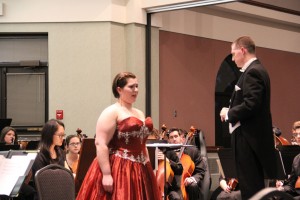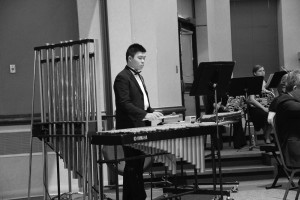
Photo Editor
On Tuesday, April 2, the OWU Chamber Orchestra performed six pieces, including an original by senior Justin Giarrusso, and one with vocal accompaniment by soprano junior Samantha Rammaha, conducted by professor Michael J. Malone.
Giarrusso composed his own piece called “Divertissement Concertante,” which was a work that captured dance aspects such as music used for ballet and featured soloists.
Giarrusso said he was asked to write a piece for the orchestra as part of the “Senior Orchestral Composition” pattern that began last year.
“(Malone) had requested I write something that would feature some of our strong and under-represented players, particularly the concertmaster (first chair, first violinist), principal cello, flute, clarinets, and harp,” he said.
Giarrusso drew inspiration from other composers to create the divertissement, which is often an “inserted segment of ballet.”
“I was thinking a lot about Vivaldi’s concerti while I was writing, especially with the idea of the returning material (ritornello) separated by contrasting sections,” he said.
Giarrusso said he had been working on the piece since November.
“It took all semester worth of rehearsing with the orchestra to prepare for the concert,” he said.
Rammaha sang alongside the orchestra in “Ah! Spietato!” a piece from the 1715 Italian opera “Amadigi di Guala” (“Amadis of Gaul” in English) by Handel.
Rammaha performed as Melissa, a sorceress in a plot of “visions and anguish of the true lovers,” according to the New Grove Dictionary of Opera’s description of the work.
Rammaha said she researched the song and lyrics and translated them from Italian to English before starting to learn the music, as she does with other pieces she performs.
“Understanding the plot of the opera was very important and helped me understand the character I was portraying and interpret the piece better,” she said.
“I also listened to and watched different performances and stagings of this aria so that I could get an idea of how people tended to interpret it.”
She said it takes about five to eight weeks to learn the song and be performance-ready.
“It only takes a week or so to learn notes and rhythms, but assimilating the translation and characterization and memorizing the piece takes the majority of the time,” she said. “It took about another four rehearsals with the orchestra to get the piece to gel with that many musicians.”
Sophomore Connor Stout played the bass for all six pieces, and said it took all semester to learn them.
His favorite was the Haydn’s “Symphony No. 104 in D Major.”
“It was incredibly involved, musically speaking, for its entire length,” he said. “Each movement was had its own infectious tune and it really kept me intrigued.”
Stout also performed in Rammaha’s and Giarrusso’s pieces as a part of the orchestra.
“(Rammaha’s) piece was interesting because the whole orchestra had to monitor their dynamics to match the vocal soloist, as opposed to Justin’s piece that was purely orchestral,” he said. 
“Justin’s piece was in a particularly difficult time signature, so that was the main challenge in that piece.”
Rammaha said her vocal training allowed her to sing this type of aria with ease compared to others.
“If you are learning to sing correctly and use your voice as organically and naturally as possible it should not be vocally strenuous,” she said. “You should not feel like it hurts. It takes years to learn this, and I am still learning.”
Stout, Giarrusso and Rammaha all said they plan on pursuing careers in music, whether in graduate school or beyond.
Stout performed in the Chamber Orchestra for the first time this year, but said he enjoyed it and plans on continuing for the next two years.
“I plan on going to graduate school to get a degree either in vocal performance or songwriting, too,” he said.
Composer Giarrusso said he will be pursuing a master’s degree in music composition next fall.
“I hope to eventually become a composition professor,” he said.
Rammaha said she isn’t planning on participating again, but enjoyed this “rare” experience.
“I think it went very well,” she said.
“I was very pleased with the performance and very grateful for the opportunity.”